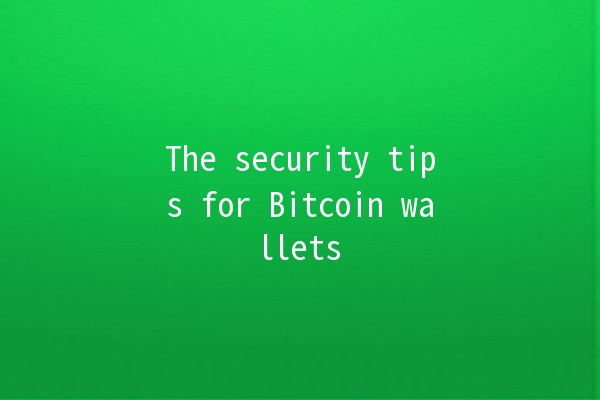




In today's rapidly growing digital currency, many people choose to use Bitcoin wallets to store and manage their crypto assets. Due to the volatility of the value of Bitcoin and other digital currencies and the potential security risks, protecting your assets has become extremely important. Here are some security tips and practical tips for protecting your Bitcoin wallet.
Dual authentication is a security measure that provides additional protection for your wallet. This means that when you log in to your wallet, you will not only need a password, but also a one-time code.
In your Bitcoin wallet, go to Security Settings and select Enable Dual Authentication. It is recommended to use a reputable authenticator (such as Google Authenticator or Authy). Every time you log in, you not only enter the password, but also the code obtained from the authenticator, so that hackers cannot access your account even if the password is taken.

Ensure that your Bitcoin wallet password is strong and unique, which can effectively reduce the risk of being hacked. Strong passwords should contain uppercase letters, lowercase letters, numbers and symbols, and be at least 12 characters long.
For example, don't use passwords that are easy to guess like "123456" or "password". You can use complex combinations like "J^3fTw1@pR$a#2023" and don't repeat the same password elsewhere. You can consider using a password manager to help manage different accounts and passwords.
Keeping track of your Bitcoin wallet account activity can help you spot suspicious activity in time. Regularly check your transaction history to ensure that all activity is legitimate.
Check your transaction log daily or weekly for any unknown transactions or unusual amounts. If you see any suspicious activity, change your password immediately and contact Bitpie customer service.
Make sure that the Bitpie applications and devices you use are up to date. Many security vulnerabilities are patched with updates.
Check the app store or your device for updates regularly to ensure that your Bitcoin wallet version is up to date. If a new version is released, make sure to update it to get the latest security patches.
The private key is the only certificate that controls your digital assets, so it must be properly stored and hidden. Do not store the private key online or share it with others.
Write down your private key and keep it in a safe place, preferably in a fireproof folder. If your wallet has a backup function, remember to back up as instructed to prevent accidental loss.
A phishing attack is a tactic in which hackers use fake websites or emails to try to steal user information. Always log in to a Bitcoin wallet through an official channel and avoid clicking on unknown links.
If you receive an email from BitPie, be sure to check the sender's address to make sure it is the official domain name. Before entering the wallet, make sure the address is correct (https://www.bitpie.com) to prevent fake websites.
Avoid sharing any information about your Bitcoin wallet or assets on social media.
Even sharing your digital assets with friends can draw unnecessary attention. Keep your voice down and keep your digital assets private to reduce the chances of being hacked.
Installing apps from unknown sources may pose a security risk. Before downloading any application, please check its source and its reviews carefully.
All downloads should be made from the official app store to ensure that no malware is installed. If you need to use certain extensions or tools, be sure to check their history and check the feedback from other users.
If you're going to hold certain digital assets for a long time, consider moving them to a cold wallet, which is a secure way to store them offline.
Hardware wallets such as Ledger or Trezor can effectively prevent online attacks. Transfer most of the assets to cold wallets, and only use hot wallets for daily transactions when necessary.
Staying informed about the market can help you make more informed investment decisions. At the same time, taking the advice of strangers lightly can lead to fraud.
Subscribe to some quality financial news websites or forums, and keep up with the news and trends related to digital currencies. In addition, be skeptical of investment advice from QQ and WeChat.
The Bitpie wallet itself is designed with a variety of security features, but the most important is how users use these features to protect their assets. Enabling dual authentication, using strong passwords and keeping applications updated can greatly improve the security of their accounts.
If you forget your wallet password, you can usually recover it through a security issue or a backup. If none of the above is possible, you may not be able to get access to it, so it is recommended to back up your wallet regularly and store it properly.
The use of a Bitcoin wallet to make a transaction is subject to a transaction fee that varies depending on the congestion of the blockchain network. These fees are intended to incentivize miners to confirm transactions, and the exact amount varies depending on the current network situation.
Personal keys should be stored offline as much as possible and in a secure physical location. Avoid storing them in easily accessible locations such as computers or mobile phones, and ensure that they are well protected at all times.
Subscribe to a professional digital currency news site or follow well-known financial media to stay on top of the industry. Also, attend relevant forums or social media groups to stay informed about market changes.
The most practical way is to decentralize the assets, for example, by allocating them between cold and hot wallets, and to regularly clear unnecessary exchange platform accounts, ensuring that as few digital assets are held as possible, to reduce risk.
By following the above security tips and advice, you will be able to protect your Bitcoin wallet more effectively and ensure that your digital assets are safe.